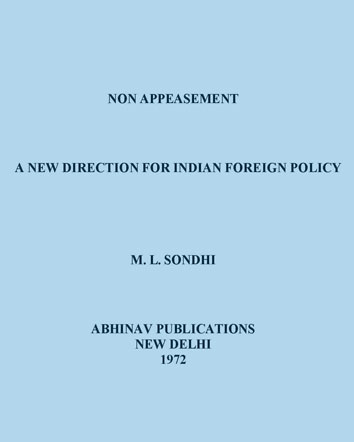Non Appeasement: A New Direction for Indian Foreign Policy
Non Appeasement: A New Direction for Indian Foreign Policy, (New Delhi: Abhinav Publications, 1972)
In this extensive analysis of the Indian foreign policy, ML Sondhi offers an alternative vision for India’s foreign policy. According to him, the ways and means of fostering an improvement in India’s image abroad cannot be found unless effort is first directed towards identifying the chief reason for the reduction of India’s policy options. This chief reason he identifies as the policy of non-alignment. Non-alignment turned out to be a scenario which instead of creating greater opportunities on matters of basic foreign policy increasingly raised technical barriers to policy adjustments and stimulated counterproductive rigid and one-sided relationships. Therefore he suggests Non Appeasement which will give a tenacious strength to India’s national interest and integrate it with the world order. In an important sense Indian decision-makers who adhere to Non Appeasement will find themselves free to come up with imaginative yet practical proposals to deal hopefully with the powerful forces of change with which India’s national interest as a modernising society is strongly linked.

